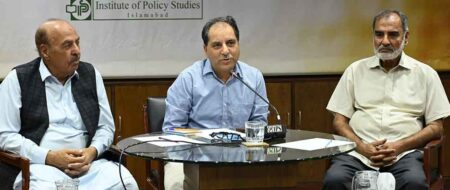Perspective on Cyber-Crime Bill, 2015
Experts urge for technical and legislative improvements in the ‘Cyber Crime Bill’
Deliberating upon the merits and demerits of the proposed Cyber Crime Bill at length, experts unanimously agreed on the need of adopting more balanced, comprehensive and technically sound approach in finalizing the legislation.
They were speaking to the session ‘Perspective on Cyber-Crime Bill, 2015′, held at the Institute of Policy Studies, Islamabad on May 13, 2015. The session was chaired by former senator and Chairman IPS Prof. Khurshid Ahmad while the keynote speakers included Major (R) Tahir Iqbal, Member NA Standing Committee on IT and Telecom and Wahaj us Siraj, Convenor ISP Association of Pakistan.
Major (r) Tahir briefed about the background of the proposed bill, sharing that it was aimed at ensuring safe and productive use of internet, protection of national assets as well as civic safety through robust cyber security, protection of children against unsuitable material, curbing hate speeches and inappropriate glorifications, prevention from cyber terrorism, unauthorized interceptions and financial crimes, as well as enabling conducive environment for the multinational IT and e-commerce organizations for business investment and operations in the country.
Wahaj viewed the present form of the bill critically stating that it had many gaps including needless duplication of laws with other already existing legislations while it also had inconsistencies in technical areas. He said that some clauses in the bill felt like an intent to control or suppress different forms of political dissent in social media which could affect the civil liberty directly or indirectly. He regarded the step as an undemocratic one especially when there were no visible restrictions of similar sort on the mainstream print and electronic media.
The session’s participants, which included lawyers, IT professionals and academics put forward several useful suggestions for the improvement in the bill including inclusion of clearer definitions of cyber offenses, distinction between cyber security and cyber-crime, establishment of computer emergency response teams (CERT), regulation of internet cafes, preventive measures against foreign cyber intrusions, establishment of help lines, and equipping investing officials and relative authorities with needed technical expertise.
Tahir appreciated the suggestions and feedback of the session’s participants stating that the standing committee on IT and telecom, which was responsible for reviewing the bill, was open to suggestions and constructive criticism and shared that it will be holding a public hearing on May 20 for the same reason. He further shared that the committee also hoped that the Government would progress towards the ratification of relevant international treaties, not only to ensure better international assistance, but also to further guarantee protection of individual rights. He also appreciated the idea of incorporating the recommendations of national judicial conference of 2013 with respect to the cyber offenses.
Prof Khurshid concluded the session stating that the bill should now pass onto becoming a legislation as it had already taken a very long time in its development. He also appreciated standing committee’s idea of taking feedback and suggestions from different stakeholders terming it a very healthy and democratic exercise. He also stressed that not only strong, vigilant and definitive mechanisms to prevent cyber offenses should be made, but their application, both in letter as well as in spirit, should also be ensured.
Seminar Outcomes: http://goo.gl/xkAt0q












